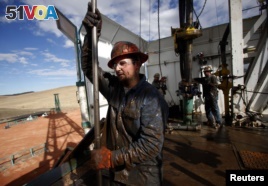17 June, 2014
North Dakota is the second largest oil-producing American state, after Texas. Companies remove about one million barrels of crude, unprocessed, oil from the Bakken Formation every day. The formation -- an area filled with shale and other rocks -- covers parts of western North Dakota and eastern Montana.
Much of the crude oil leaves the area by train. But several accidents have raised concerns about the method of transportation and the oil itself.
Last July, a train pulling 72 tank cars wrecked in the Canadian town of Lac Megantic. The wreck caused an explosion and fire that killed 47 people.

Roughneck Brian Waldner is covered in mud and oil while wrestling pipe on a True Company oil drilling rig outside Watford, North Dakota, October 20, 2012. Thousands of people have flooded into North Dakota to work in state's oil drilling boom. REUTERS/Jim
The crude oil in the tank cars came from the Bakken formation. Several accidents since then have raised concerns about the explosive nature of Bakken crude oil. The U.S. Department of Transportation recently ordered shippers to test Bakken oil to make sure it is correctly identified before shipping.
But several studies have found that Bakken oil is no more dangerous than other U.S. oil. Jeff Hume is vice chairman of Continental Resources, an oil production company.
"From what we tested and what we have gotten, it fits the specifications that FIMSA has today for the rail cars that we are shipping it in. So under today's rules, we are moving it in a proper container."
About 70 percent of North Dakota and Montana crude oil is transported by train. Kari Cutting is vice president of the North Dakota Petroleum Council. She says shippers and producers are following government rules.
"All of those federal regulations that have been followed by Bakken, since we started producing Bakken, as far as classifying it, putting it in rail cars, moving it safely, all of the things that the shippers and producers have to do before it goes into that railcar, all of those rules were followed."
The safety concerns about rail transportation have shown the need for more oil pipelines. But North Dakota State University Economist Dean Bangsund says oil pipelines are in short supply.
"A big issue in the state right now is the lack of pipeline capacity, and that the pipeline capacity to take the crude oil out of the state ends up with large price discounts. So the industry is now moving, to moving crude oil out of the state by rail."
The proposed Keystone XL Pipeline would connect pipes from Canada to the southern United States. Under the plan, 100,000 barrels of Bakken crude oil would flow each day to a proposed link in the town of Baker, Montana.
Dean Bangsund talks about the proposal.
"Some of the crude that's coming through our existing pipelines would be moved into that, therefore displacing and adding existing capacity to some of the pipelines we already have in place."
But concerns about the environmental risks of the Keystone XL pipeline have delayed the plan. The price of shipping crude oil by rail usually costs more than pipelines. But some companies still like that method because trains can reach more oil processing centers than existing pipelines.
I'm Jonathan Evans.